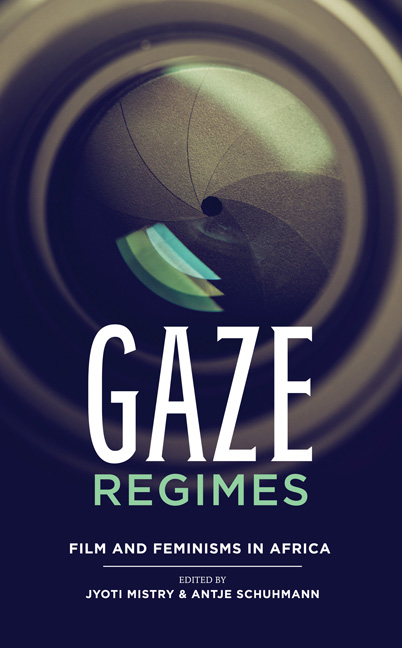Book contents
- Frontmatter
- Contents
- Acknowledgements
- Foreword: Goethe-Institut sub-Saharan Africa
- Introduction: By way of context and content
- 1 African Women in Cinema: An overview
- 2 ‘I am a feminist only in secret’
- 3 Staged Authenticity: Femininity in photography and film
- 4 ‘Power is in your own hands’: Why Jihan El-Tahri does not like movements
- 5 Aftermath – A focus on collective trauma
- 6 Shooting Violence and Trauma: Traversing visual and social topographies in Zanele Muholi's work
- 7 Puk Nini – A Filmic Instruction in Seduction: Exploring class and sexuality in gender relations
- 8 I am Saartjie Baartman
- 9 Filmmaking at the Margins of a Community: On co-producing Elelwani
- 10 On Collective Practice and Collected Reflections
- 11 ‘Cinema of resistance’
- 12 Dark and Personal
- 13 ‘Change? This might mean to shove a few men out’
- 14 Barakat! means Enough!
- 15 ‘Women, use the gaze to change reality’
- 16 Post-colonial Film Collaboration and Festival Politics
- 17 Tsitsi Dangarembga: A manifesto
- Acronyms and Abbreviations
- List of Contributors
- Filmography
- Index
1 - African Women in Cinema: An overview
Published online by Cambridge University Press: 20 April 2018
- Frontmatter
- Contents
- Acknowledgements
- Foreword: Goethe-Institut sub-Saharan Africa
- Introduction: By way of context and content
- 1 African Women in Cinema: An overview
- 2 ‘I am a feminist only in secret’
- 3 Staged Authenticity: Femininity in photography and film
- 4 ‘Power is in your own hands’: Why Jihan El-Tahri does not like movements
- 5 Aftermath – A focus on collective trauma
- 6 Shooting Violence and Trauma: Traversing visual and social topographies in Zanele Muholi's work
- 7 Puk Nini – A Filmic Instruction in Seduction: Exploring class and sexuality in gender relations
- 8 I am Saartjie Baartman
- 9 Filmmaking at the Margins of a Community: On co-producing Elelwani
- 10 On Collective Practice and Collected Reflections
- 11 ‘Cinema of resistance’
- 12 Dark and Personal
- 13 ‘Change? This might mean to shove a few men out’
- 14 Barakat! means Enough!
- 15 ‘Women, use the gaze to change reality’
- 16 Post-colonial Film Collaboration and Festival Politics
- 17 Tsitsi Dangarembga: A manifesto
- Acronyms and Abbreviations
- List of Contributors
- Filmography
- Index
Summary
African cinema born during the African independence movements of the 1950s and 1960s re-appropriated the camera as a tool to counter the colonialist gaze that had dominated representations of Africa up until that time. The emergence of women in African cinema coincided with this nascent period during which a cadre of film professionals positioned themselves for the creation of a veritable African cinema culture. One such professional of note is the pioneer of Senegalese media culture, Annette Mbaye d'Erneville: feminist, journalist, writer, communications specialist, media activist and culture critic. The first Senegalese to earn a degree in journalism, she studied in Paris in the late 1940s, and since returning to Senegal in 1957 she has devoted her life to the cultural politics of the country, forging important institutions such as the Association Senegalaise de la Critique Cinematographique, Rencontres Cinematographiques de Dakar (RECIDAK), and the Henriette Bathily Women's House.
Similarly, Guadeloupean Sarah Maldoror, who was born and raised in France, joined forces with artists from Africa and the Caribbean during a time of heightened cultural, intellectual and political discovery. In the early 1960s she went to Moscow to study filmmaking. Having already joined the pro-independence movements, it is not surprising that her films would take on similar anti-colonialist themes. She has been a mentor and role model to many African women filmmakers, notably Togolese Anne-Laure Folly Reimann, whose film Sarah Maldoror ou la nostalgie de l'utopie (1998) traces her own life as filmmaker engagée.
Several women were among the film professionals who established the Pan African Film and Television Festival of Ouagadougou (FESPACO) and the Pan African Federation of Filmmakers (FEPACI), both created in 1969. These two exemplary African cinema institutions continue to be a reference for continental co-operation and organisation in the area of culture. Zalika Souley, trailblazing actress from Niger, served on the founding committee of FEPACI, while Burkinabe Alimata Salembere, one of the founding members of FESPACO, and whose compatriot Odette Sangho was also a member, presided over the organising committee of the first festival. The documentary Tam Tam à Paris, made in 1963 by journalist Therese Sita-Bella, was among the entries at the festival and is considered the earliest film by an African woman.
- Type
- Chapter
- Information
- Gaze RegimesFilm and feminisms in Africa, pp. 1 - 9Publisher: Wits University PressPrint publication year: 2015



